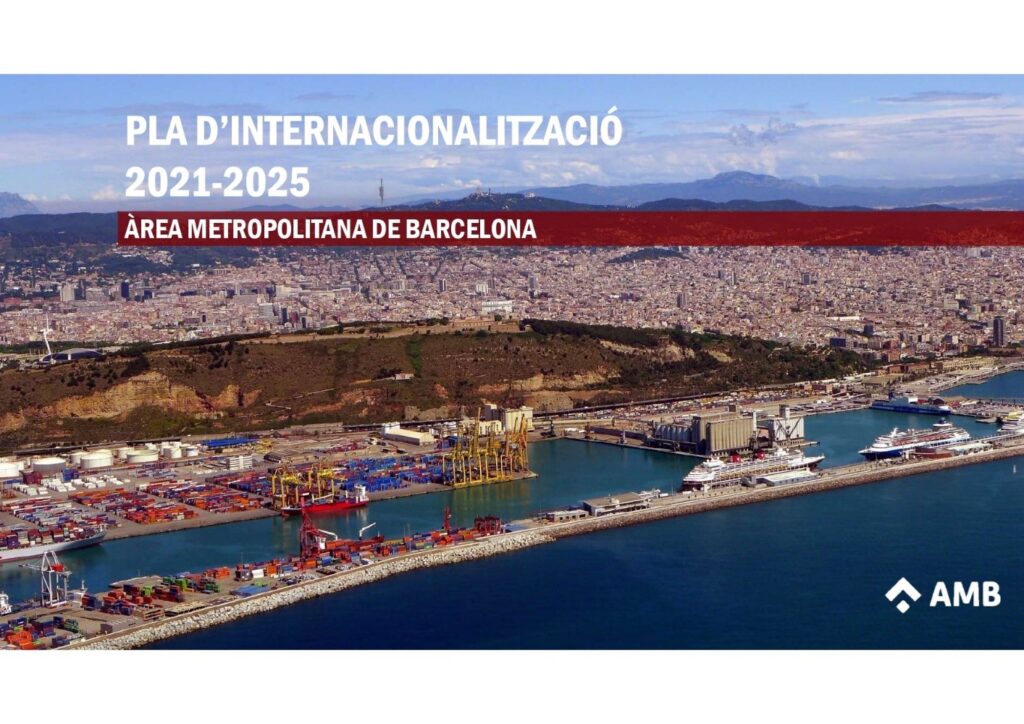Cases, International Relations and Cooperation, strategic planning
Internationalization Plan of the Barcelona Metropolitan Area2021-2025

The Internationalization Plan of the AMB for the period 2021-2025 aims to establish the international strategy for the institution as a whole, promote the metropolitan dimension, promote the raising of funding for strategic projects and facilitate cooperation, innovation and knowledge transfer.
This is one of the first internationalization plans carried out by a metropolitan entity worldwide. The Plan was approved by the Metropolitan Council on July 27, 2021. The Plan was presented after a consultation process in which over 30 interviews and meetings were held with about a hundred institutions of the metropolis and abroad: local councils, public and private metropolitan bodies, research centres, think tanks, international networks, technical services of the AMB, etc.
The Plan materialises the Metropolitan Action Plan (PAM) 2019-2023, which aims to boost the AMB’s projection abroad in line with the 2030 Agenda and the sustainable development goals (SDGs), the New Urban Agenda (Habitat III), the Paris Agreement on climate change, the European Green Deal, the Leipzig Charter, the Pact of Amsterdam and the defence of human rights, among others.
Tags: International relations, international strategy, International cooperation, international metropolitan plan, internationalization
Challenges addressed
The AMB Internationalisation Plan 2021-2025 takes on the challenges of the entire institution and its territory. Through this plan, AMB aims to provide support and solutions using a structured and shared strategy. Key challenges addressed by the plan include:
a) Advancing Sustainable Policies: Aligning and integrating sustainable practices across key sectors such as transport, mobility, housing, energy and water and waste management, in line with global climate and environmental goals.
b) Fostering innovation and digital transition: Promoting the adoption of cutting-edge technologies and driving digital transformation within metropolitan services to enhance efficiency and quality.
c) Strengthening economic projection: Developing strategies to internationally promote the metropolitan area unique assets, attract investments, and stimulate socio-economic growth.
d) Enhancing Social and Territorial Cohesion: Focusing on improving social inclusion and achieving balanced territorial development to reduce disparities within the metropolitan area.
e) Transforming Productive Models: Supporting the transition towards innovative, competitive, and sustainable economic models to foster resilience and adaptability in the local economy.
f) Influencing European and International Agendas: Aiming to project AMB’s interests on European and global agendas, ensuring that metropolitan needs and priorities are reflected in international policies and programmes.
g) Securing International Funding: Targeting the acquisition of international funds for transformational projects, utilizing opportunities to drive local development initiatives.
h) Expanding Knowledge Management: Enhancing the exchange, capitalization, and application of knowledge through robust partnerships with local and international entities and networks to foster a culture of learning and innovation.
By addressing these challenges, the AMB Internationalisation Plan aims to position the metropolitan area as a leader in sustainable development, innovation, and economic and social development, while enhancing the quality of life for its residents.
Main objectives
The general objective of the Internationalisation Plan is to boost sustainability, competitiveness, the innovation dimension, the quality and effectiveness of policies promoted by the AMB and project its assets. This general objective will be deployed through three specific targets:
- a) Impact European and international political agendas to promote the interests, needs, and expectations of the AMB and the metropolitan territory.
- b) Help to transform the productive model and the social and territorial cohesion of the metropolis of Barcelona.
- c) Project the AMB as an innovative public administration, focused on knowledge, based on values, and open to the world.

Publications & main documents
MORE CONTENTS
Sorry, no posts matched your criteria.



